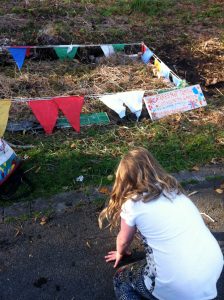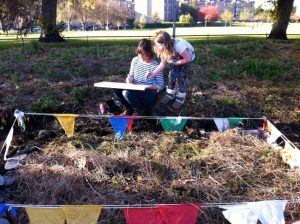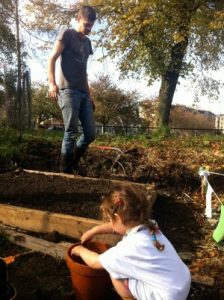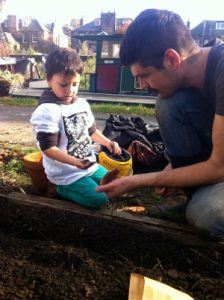Trees Not Trash has landed in Scotland! by Kate Gilliam
We have started the first of TNT Edinburgh’s community green spaces, on a stretch of unused land adjacent to the Union Canal in the Shandon area of Edinburgh. This piece of land is generally overgrown with a forest of stinging nettles, so we are transforming it into usable growing space. We have chosen this spot for its high pedestrian traffic and proximity to water, and have so far enjoyed great support and met many keen gardeners who have been dropping by to help out with our Sunday gardening days! We garden every Sunday from 11am onwards.

So far we have built 3 vegetable beds, and have planted crops chosen for their winter hardiness: kale, black radishes, oriental greens, spinach, cauliflower and rocket. We have also planted an apple tree and a berry bush and plan on much more.

So why here, why now? I had been intending on starting a new community garden/green space in Edinburgh for some time, certainly since last summer, but hadn’t found the right spot for it yet. I had been eyeing spaces that were far more disused, derelict even, rather than the canal-side space we have started with. Of course it makes perfect sense to start a community garden in the location that we have chosen: it is public, well-traveled, unused, sheltered, and right next to a water source (the canal!). I am quite happy to start projects like these and see who comes to it on their own.
I often find the folks who are most keen will readily join in, and that is all it takes for them to be part of the team! The location lends itself to people getting involved, especially on a weekend when schedules are a little more relaxed. Some folks who have stopped, only intending to talk and say hi, have stayed for an hour or more, digging holes and suggesting planting ideas
Harrison Park is right next to our new garden, but given the opportunity, the kids choose to hang around by the canal, explore the fallen trees and old stumps, look for wild mushrooms and “fish” with sticks in the canal, rather than play in the playground. The kids who come each week to help us garden are completely engaged and will happily spend hours digging for worms, sowing seeds, watering, and enjoying the space. A garden provides so many opportunities for people to engage with, affect change in and help develop….it’s endless, really!

Planting our little garden in Edinburgh is an example of guerilla gardening. While guerilla gardening is a defiant act in many ways, it is also an act of community building, of improving things for the residents, and laying claim to what is yours, and mine, and everyone else’s. That is to say, planting a garden in an area of your neighborhood or city that is otherwise not being used, or being disused as a dumping ground, is your right, and your responsibility. We all share the public space that we live in, so we should all help to take care of it.
I decided to include “steal-able” things in our garden here, not to entice people to take them, but rather to show that there isn’t a “do not touch” element to our garden. I had someone comment that people would indeed steal the hanging baskets, but so far no one has disturbed even a pansy! Theft can be an issue with public gardens, as I experienced soon after I started the first green spaces in Brooklyn, NY, I had built these amazing wooden planters for the neighborhood streets, and I planted beautiful zinnias in them (among other things).
Zinnias are some of the cheeriest, prettiest flowers i think, and always made me happy when i went out to water them in the mornings. One morning however, i came out to find someone had stolen my beautiful flowers, right out of the soil, plants and all! My initial feelings were anger and upset, and I swiftly started plotting a stake-out so I might catch the zinnia thief! A similar thing happened in the community garden soon after, with someone stealing prize flowering rose bushes, an evergreen tree (!) and some other magnificent specimens, and again I felt the same way, but more so…almost defeatist about putting so much effort into something that people were just going to destroy.

But really, the answer was not to lock the gates, or plan a stake-out, or give up! The answer was to work harder to involve the community and let them know what you are trying to do, and include them in your efforts by getting them involved in the garden. I offered to give away plants to anyone who would come to the garden, and showed them how to make their plants grow. Giving free plants to someone meant that they no longer had to steal the ones I planted. I hoped the people who stole the flowers would hear about what I was doing (i talked to anyone who would listen to me while I was gardening!), and that they would realize I wasn’t part of the city, or some government organization, but someone who lived there and was trying to make the neighborhood better for all of us.
And it worked. I never had another problem in the 6 years of running TNT. Being out on the streets, talking to the old folks and the young thugs and the little kids and the cops and whomever else wanted to know what i was doing, ensured that people were more willing to help and protect these plants and trees that were making their neighborhood a better, more beautiful place to live.

It is important to encourage community gardening for so many reasons. Gardening and food-growing knowledge builds confidence in people. There is something very satisfying and empowering about growing a vegetable from a seed, watching it turn into a plant, being able to see what it looks like while it is growing, and finally, being able to eat it. That confidence can lead to all sorts of exciting things; children who learn how to garden are then able to teach their friends, or their siblings and parents.
Not only does it make economic sense to grow your own food (which you can do without a garden, in very small spaces!) but you have learned something crucial about the world, your ability to instigate change, the freedom that comes with being able to be more self-sufficient, and the satisfaction of acquiring real, useful skills that can be transferred to all sorts of jobs. Knowledge is power, indeed, and food is not something that should come to us by way of plastic packaging. It should be something we engage with, learn about and take joy in growing!
There is a distinct lack of land in Edinburgh for growing produce, as anybody who has been on a wait-list for allotments can tell you (I checked, and most allotment waiting lists near this neighborhood and beyond are on average of 6 years long…). That is a long time to wait to grow your own vegetables! We are doing something on a much smaller level, but encourage anyone and everyone to get involved. Our waiting list is one week… (every Sunday!)
For more info on Trees Not Trash Edinburgh, and how you can get involved, please email
[email protected]
www.treesnottrash.org
